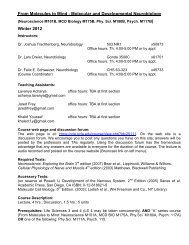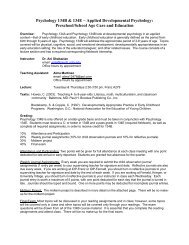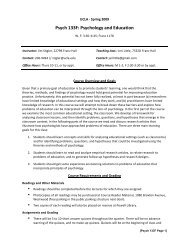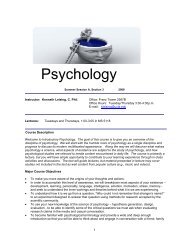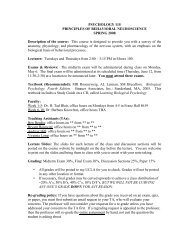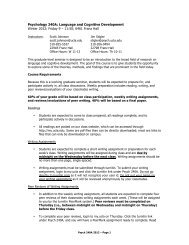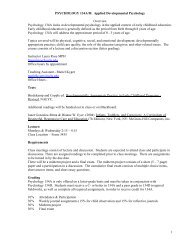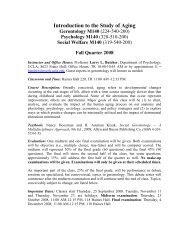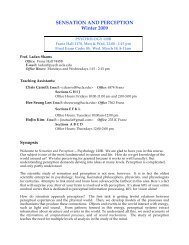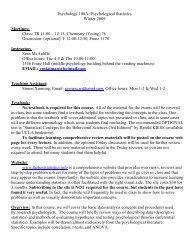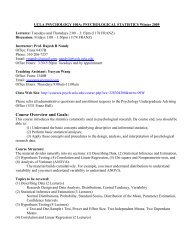sensation and perception - Courses in Psychology - UCLA
sensation and perception - Courses in Psychology - UCLA
sensation and perception - Courses in Psychology - UCLA
Create successful ePaper yourself
Turn your PDF publications into a flip-book with our unique Google optimized e-Paper software.
<strong>Psychology</strong> 120B Sensation & Perception 2such as light <strong>and</strong> sound. From patterns formed <strong>in</strong> this energy, perceptual systems extract<strong>in</strong>formation about structure <strong>and</strong> events <strong>in</strong> the world. To underst<strong>and</strong> all this, we need accounts of the<strong>in</strong>formation, of computational processes, <strong>and</strong> of neural mechanisms. The study of <strong>perception</strong> teaches theneed for multiple levels of analysis <strong>in</strong> the study of the m<strong>in</strong>d.Study<strong>in</strong>g <strong>perception</strong> also raises the deepest issues about the nature of reality, m<strong>in</strong>d, <strong>and</strong> knowledge.What is real? Is <strong>perception</strong> a direct l<strong>in</strong>k to reality? We are all familiar with illusions or failures of<strong>perception</strong>. Yet, if we know reality through <strong>perception</strong>, what does it mean to perceive <strong>in</strong>correctly?The consequences for science are as large as for the <strong>in</strong>dividual. In all of its branches, scientificknowledge depends on observation; as such it requires a coherent account of how we obta<strong>in</strong>knowledge by perceiv<strong>in</strong>g.The stakes are high -- <strong>in</strong>tellectually, but also practically. Analyz<strong>in</strong>g <strong>perception</strong> allows us tocommunicate <strong>and</strong> to depict; to imag<strong>in</strong>e <strong>and</strong> to build artificial systems, such as virtual realitysystems. Investigat<strong>in</strong>g the neural hardware of <strong>perception</strong> helps us to underst<strong>and</strong> <strong>and</strong> treat <strong>in</strong>jury<strong>and</strong> disorder. Perception issues arise <strong>in</strong> many facets of life, such as <strong>in</strong> the design of aircraft displays<strong>and</strong> controls, highways, motion pictures, <strong>and</strong> Ipods, to name only a few.Although a 10-week, first course <strong>in</strong> <strong>perception</strong> is necessarily limited <strong>in</strong> the scope, you are <strong>in</strong>vited toexplore issues <strong>in</strong> doma<strong>in</strong>s with<strong>in</strong> <strong>and</strong> beyond our course material with the <strong>in</strong>structor <strong>and</strong> TAs <strong>and</strong>especially on the course website. Your <strong>in</strong>structor has been do<strong>in</strong>g scientific research <strong>in</strong> <strong>perception</strong>for a long time, <strong>and</strong> has also been <strong>in</strong>volved <strong>in</strong> a wide range of applications, <strong>in</strong>clud<strong>in</strong>g aviation <strong>and</strong>air traffic control, vehicle accident cases (as an expert witness, not a participant), consultant togovernment <strong>and</strong> law enforcement agencies, <strong>and</strong> development of educational technology.Discussions with your <strong>in</strong>structor, TAs, <strong>and</strong> on the course website can help you to relate thecoursework to your <strong>in</strong>terests <strong>and</strong> to exp<strong>and</strong> your <strong>in</strong>volvement <strong>in</strong> the study of <strong>perception</strong>.Our course will emphasize visual <strong>perception</strong>, both our most important sense <strong>and</strong> the one moststudied. We will also discuss auditory <strong>perception</strong> <strong>and</strong> issues that span all perceptual systems.Course Prerequisites <strong>and</strong> Related Information<strong>Psychology</strong> 120B fulfills a core course requirement for the <strong>Psychology</strong> <strong>and</strong> related majors.Prerequisites <strong>in</strong>clude prior fulfillment of <strong>Psychology</strong> 10 <strong>and</strong> <strong>Psychology</strong> 100A.Because this course has been designated as an "impacted" course, the Department of <strong>Psychology</strong> hasrequested that the follow<strong>in</strong>g <strong>in</strong>formation be <strong>in</strong>cluded here:1) If you are not enrolled <strong>in</strong> a discussion section by the end of the second week of the quarter, youwill be dropped by the computer. Furthermore, CORE courses are over-enrolled to compensate forthe typical drop rate. For this reason, Permission to Enroll Authorization Numbers (PTE's)will not be issued for this course. Students with concerns should go to the <strong>Psychology</strong>Advis<strong>in</strong>g Office, 1531 Franz Hall. All enrollment issues must be h<strong>and</strong>led by the Advis<strong>in</strong>g Office.2) You cannot drop an impacted course after the second week of a term for other than exceptionallyextenuat<strong>in</strong>g circumstances which must be approved by the L&S Executive Committee on referral bycollege counsel<strong>in</strong>g units. Exceptionally extenuat<strong>in</strong>g circumstances do not <strong>in</strong>clude circumstances ofshort duration where other alternatives exist, <strong>in</strong>clud<strong>in</strong>g but not limited to a late drop of other(nonimpacted) courses or tak<strong>in</strong>g an Incomplete <strong>in</strong> the impacted course.



